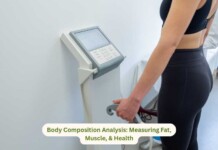Most of you over 40 might nod in agreement that buttoning up your jeans has become an increasingly challenging task every day, even though you maintain the same diet and workout regimen. The number on your weighing scale might be creeping up gradually, and when you discuss this with your girls’ gang, they can relate to this same scenario. Though age might be just a number, you cannot stop the changes that your body experiences as you become older. Weight gain during midlife and alterations in your body composition, such as accumulation of midsection fat can be frustrating. As you cross 40, you might also face lower levels of estrogen, sluggish metabolism, insulin resistance, cardiovascular issues, and hot flashes. Thankfully, you can reverse these age-related changes by making lifestyle modifications and exploring non-invasive treatments to handle such challenges and enhance overall health.
Why Weight Gain Becomes More Common After 40
It is true that battling weight gain after 40 is a struggle. The SWAN or Study of Women’s Health Across the Nation revealed that women aged between 40 and 65 years tend to pile up to 1.5 pounds on average every year [1]. Also, a study by Nurses’ Health showed that women in their midlife accumulated up to 7 pounds on average during their follow-up for 8 8-year period [2]. There are several reasons why women aged over 40 gain body weight.
1. Decline in Estrogen Levels
Most of the women face premenopausal changes once they reach 40. Your body will experience fluctuations in estrogen levels during the transition phase from premenopause to menopause. Your estrogen levels determine the fat distribution rate in your body. Your estrogen levels tend to decline up to 50% between your 40s and 50s.
- There are 3 types of estrogen, such as E3 or Estriol, E2 or Estradiol, and E1 or Estrone.
- Each type of estrogen has a specific function to perform and E2 is the most powerful estrogen type.
- Women will have high levels of E2 until their mid-age and then E1 levels will begin to rise than E2 levels after menopause.
- As soon as you are over 40 E2 levels begin to decline as your ovaries will stop producing this estrogen type.
- Your body will have more E1-type estrogen, which will trigger weight gain as it is biologically inactive.
2. Loss of Muscle Mass
As you reach your mid-40s, you might face loss of muscle strength because doing regular chores might seem tiring and require more effort than before. The rate of muscle loss depends on various factors, including your body type, lifestyle, diet, and physical activity.
- With age, your body will naturally experience Sarcopenia or loss of muscles [3].
- A study has shown that a decline in estrogen levels is responsible for muscle loss [4].
- The research was performed with two groups consisting of mice and they found out that both groups experienced the loss of muscle stem cells by up to 60% and the formation of muscle fibers did not happen quickly.
- This was due to the decrease in estrogen level and the low amount of receptors of estrogen hormone couldn’t help build muscles quickly.
- So, your resting metabolic rate tends to decline owing to less muscle mass and your body gains weight even if you are following the same diet.
3. Low Bone Density
Women aged above 40 years are more prone to developing osteoporosis than their male counterparts. It occurs due to the fluctuations in the hormone levels as you age and during your premenopause and menopause stages.
- A study conducted with mice showed that estrogen had a key role in preventing the occurrence of osteoporosis [5].
- Your estrogen levels in the body are responsible for handling bone metabolism activity and influence triple bone cells in your body – osteoclasts, osteoblasts, and osteocytes [6].
- Of these three bone cells, osteocytes have longevity and constitute up to 95% of your bone cell tissue.
- A decline in estrogen levels in women above 40 causes an inability in bone cells to support solid bone structure or form new bones.
- Being metabolically active, less bone mass indicates lower metabolism and fat gain with time.
4. Hormonal Changes and Menopause-Related Fat Accumulation
The major reason behind the weight gain among women over 40 is the decline in their estrogen and testosterone levels. Your fat cells, adrenal glands, ovaries, and skin produce testosterone, which might be just 1/20th of the hormones produced by males. It is responsible for regulating your bone health.
- Normally, your body will produce about 70 ng/dl and it will decline lower than 15 ng/dl as you reach mid-age.
- So, there would be a decline in your bone density in your late 40s [7].
- A sharp fall in estrogen and a spike in FSH or follicle stimulating hormone have a vital role in making you gain weight after 40 years of age.
- Your estrogen levels tend to be higher before the menopause stage.
- It helps in improving muscle strength and mass while influencing the way the fat gets stored in your body, specifically in your thighs, breasts, and butt.
- However, during menopause, the fat accumulates in your abdomen, waist, and love handles due to the loss of estrogen.
Lifestyle Habits That Work Against You After 40
Once you reach the age of 40, specific lifestyle habits can negatively influence your health, especially when your hormone level changes during menopause. Ignoring these lifestyle habits might increase the risk of developing chronic medical issues and affect your overall health.
- Lack of Nutrition in Diet: If you love consuming foods loaded with sugar, fat, and processed ingredients, it can lead to weight gain, type 2 diabetes, and cardiovascular issues.
- Not Exercising: If you maintain a sedentary lifestyle without scheduling time for physical activity, you are at a higher risk of developing heart issues and weight gain. Plus, you might fall often as your body will begin to face muscle loss.
- Irregular Sleeping Pattern: Continued sleep deprivation can have a negative influence on your mood, productivity, immunity levels, and cognitive function. Plus, you are more prone to developing risky chronic illnesses.
- Too Much Stress: Prolonged stress due to issues in personal or professional life can take a toll on your mental well-being as well as physical health.
- Bad Relationships: If you are ignoring your social circles and are in a bad relationship that causes mental trauma or abuse, it can make you stay isolated and feel lonely.
- Alcohol Intake and Smoking: These activities might increase your risk of developing stroke, heart dysfunction, cancer, weight gain, liver damage, and bone loss.
- Not Taking Regular Check-ups: It is essential to take regular health screenings as ignoring health checkups might delay early diagnosis and treatment of chronic medical conditions.
Medical Conditions That Make Weight Loss Harder
These medical conditions can make it challenging for you to lose weight once you cross 40.
- Hormonal Issues: You might have low levels of estrogen due to menopause, which can lead to increased midsection fat, which can make it hard to lose weight. Hormonal disorders like PCOS or Polycystic Ovary Syndrome can also cause excess body weight, making it tough to lose it.
- Thyroid Conditions: If you have hypothyroidism caused by an underactive thyroid gland or an autoimmune condition like Hashimoto’s disease, your body weight management and metabolic activities can be difficult to handle.
- Insulin Resistance: This medical condition will prevent your body from utilizing insulin and cause weight gain. Women having insulin resistance might have a tough time trying to shed extra pounds.
- Cushing’s syndrome: It occurs due to a high level of cortisol production that can lead to too much weight gain, especially in the abdomen region.
How to Reverse Weight Gain After 40
- Be Mindful of Diet: Ensure your diet with portion control has more protein and nutrient-dense foods. Include whole foods like lean proteins, whole grains, fruits, and vegetables to improve satiety, and metabolism, and maintain sugar levels.
- Positive Mindset: Practice stress reduction techniques like meditation or yoga and sleep well to prevent cortisol levels from increasing.
- Prioritize Activity: Schedule a combination of strength training and cardiovascular activities with moderate intensity to burn calories and improve metabolism.
Treatments That Help Women Over 40 Lose Weight Without Surgery
Several non-invasive treatments are available for women aged above 40 to lose weight safely without any side effects.
- Cryolipolysis: This CoolSculpting procedure employs cooling technology that is controlled to target the midsection fat or stubborn fat in thighs or flanks by freezing.
- EvolveX Treatment: This innovative treatment is non-invasive and combines Radiofrequency and Electromagnetic Stimulation to remove fat pockets and tone up your muscles.
- Lipo Gel Treatment: This novel procedure uses a special laser to target the fat cells, making it pain-free, safe, and quick.
How Kolors Supports Women Over 40 in Their Weight Loss Journey
At Kolors Healthcare, we realize that losing weight after 40 is not just about making changes to your physical activity and diet, but understanding what your body needs. We strive to make your weight loss journey sustainable and smarter. We provide:
- Individualized health assessments including lifestyle mapping, medical screening, and analysis of body composition.
- Our nutritionists create effective weight loss plans that are hormone-friendly.
- Non-invasive inch loss treatments for a sculpted and toned figure.
- Personalized fitness guidance and support to manage stress, detox, and rejuvenate the body.
Citation Links
- Santoro, N., & Sutton-Tyrrell, K. (2011). The SWAN Song: Study of Women’s Health Across the Nation’s Recurring Themes. Obstetrics and Gynecology Clinics of North America, 38(3), 417-423. https://doi.org/10.1016/j.ogc.2011.05.001 – https://www.sciencedirect.com/science/article/abs/pii/S0889854511000659?via%3Dihub
- Field, A. E., Willett, W. C., Lissner, L., & Colditz, G. A. (2007). Dietary Fat and Weight Gain Among Women in the Nurses’ Health Study. Obesity, 15(4), 967-976. https://doi.org/10.1038/oby.2007.616 – https://onlinelibrary.wiley.com/doi/full/10.1038/oby.2007.616
- Geraci, A., Calvani, R., Ferri, E., Marzetti, E., Arosio, B., & Cesari, M. (2021). Sarcopenia and Menopause: The Role of Estradiol. Frontiers in Endocrinology, 12, 682012. https://doi.org/10.3389/fendo.2021.682012 – https://www.frontiersin.org/journals/endocrinology/articles/10.3389/fendo.2021.682012/full
- Collins, Brittany C. et al. Cell Reports, Volume 28, Issue 2, 368 – 381.e6 – https://www.cell.com
- 1Institute of Molecular and Cellular Biosciences, University of Tokyo, Yayoi 1-1-1, Bunkyo-ku, Tokyo 113-0032, Japan – https://www.cell.com/cell/pdf/S0092-8674(07)00962-2.pdf
- Khosla S, Oursler MJ, Monroe DG. Estrogen and the skeleton. Trends Endocrinol Metab. 2012 Nov;23(11):576-81. doi: 10.1016/j.tem.2012.03.008. Epub 2012 May 16. PMID: 22595550; PMCID: PMC3424385. – https://pmc.ncbi.nlm.nih.gov/articles/PMC3424385/
- Mattick LJ, Bea JW, Singh L, Hovey KM, Banack HR, Wactawski-Wende J, Manson JE, Funk JL, Ochs-Balcom HM. Serum Follicle-Stimulating Hormone and 5-Year Change in Adiposity in Healthy Postmenopausal Women. J Clin Endocrinol Metab. 2022 Jul 14;107(8):e3455-e3462. doi: 10.1210/clinem/dgac238. PMID: 35435955; PMCID: PMC9282244. – https://pubmed.ncbi.nlm.nih.gov/35435955/









